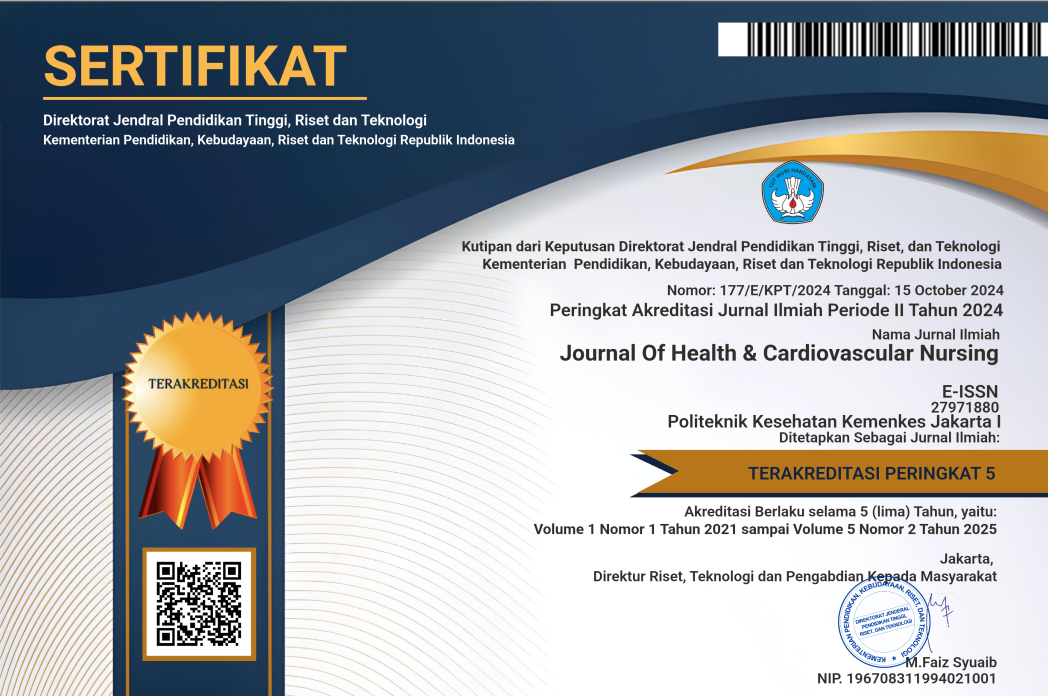Using of mHealth in the Management of Stroke Risk Factors as Stroke Prevention Efforts : Literature Review
Penggunaan mHealth Dalam Manajemen Faktor Risiko Sebagai Upaya Pencegahan Stroke : Literature Review
Keywords:
stroke, mHealth, risk factorsAbstract
Stroke is a leading cause of death and disability in the world. Despite advances in stroke treatment, only limited number of patients are eligible for these medical and endovascular intervention. Additionally the outcome are unfavoranble for many indiviuals. Therefore stroke prevention is crucial. Various innovations have been created to make life easier, one of which is mHealth, which refers to the use of mobile devices to support health services. The aimed of this study is to evaluate the use of mHealth in managing risk factors as prevention stroke efforts. This study was used the PRISMA method with keyword adult at risk of stroke, mHealth intervention and stoke prevention. Articles were collected from databased online from 2019 to 2023. There are four qualify experimental articles for this topic. There is one article about using mHealth for screening atrial fibrillation, 2 articles about mHealth for activity and lifestyle promotion, and 1 article about mHealth to improve medication adherence of DM and decrease atherosclerotic vasculardisease (ASCVD) score. mHealth is potentially useful for individual at risk of stroke. Further research is needed to determine to which mHealth can be accessed and utilized by various population, as well as the security and user privacy aspect.Downloads
References
Crico, C., Renzi, C., Graf, N., Buyx, A., Kondylakis, H., Koumakis, L., & Pravettoni, G. (2018). mHealth and telemedicine apps?: in search of a common regulation. eCancer.
Dharma, K. K., & Parellangi. (2020). Use of mobile-stroke risk scale and lifestyle guidance promote healthy lifestyles and decrease stroke risk factors. International Journal of Nursing Sciences, 7(4), 401–407.https://doi.org/10.1016/j.ijnss.2020.08.001
Diener, H. C., & Hankey, G. J. (2020). Primary and Secondary Prevention of Ischemic Stroke and Cerebral Hemorrhage: JACC Focus Seminar. Journal of the American College of Cardiology, 75(15), 1804–1818.https://doi.org/10.1016/j.jacc.2019.12.072
Feigin, V. L., Stark, B. A., Johnson, C. O., Roth, G. A., Bisignano, C., Abady, G. G., Abbasifard, M., Abbasi-Kangevari, M., Abd-Allah, F., Abedi, V., Abualhasan, A., Abu-Rmeileh, N. M. E., Abushouk, A. I., Adebayo, O. M., Agarwal, G., Agasthi, P., Ahinkorah, B. O., Ahmad, S., Ahmadi, S., … Murray, C. J. L. (2021). Global, regional, and national burden of stroke and its risk factors, 1990-2019: A systematic analysis for the Global Burden of Disease Study 2019. The Lancet Neurology, 20(10), 1–26. https://doi.org/10.1016/S14744422(21)00252-0
Gurol, M. E., & Kim, S. (2018). Advances in Stroke Prevention in 2018. Journal of stroke, 20(2), 143–144.
Jacob, C., Sanchez-Vazquez, A., & Ivory, C. (2020). Social, organizational, and technological factors impacting clinicians’ adoption of mobile health tools: Systematic literature review. JMIR mHealth and uHealth, 8(2), 1–30. https://doi.org/10.2196/15935
Kurniawan, N. (2022). Penggunaan Mobile Health Dalam Manajemen Pengelolaan Perawatan Pasien Hipertensi?: Studi Literatur Use Of Mobile Health In Care Management Hypertension Patients?: Literature Study Abstract Pendahuluan Hipertensi merupakan salah satu jenis penyakit kardiov. JHCN 2, 108–119. https://doi.org/10.36082/jhcn.v2i2.442
Lakshminarayan, K., Westberg, S., Northuis, C., Fuller, C. C., Ikramuddin, F., Ezzeddine, M., Scherber, J., & Speedie, S. (2018). A mHealth-based care model for improving hypertension control in stroke survivors: Pilot RCT. Contemporary Clinical Trials, 70(December 2017), 24–34. https://doi.org/10.1016/j.cct.2018.05.005
Lindsay, M. P., Norrving, B., Sacco, R. L., Brainin, M., Hacke, W., Martins, S., Pandian, J., & Feigin, V. (2019). World Stroke Organization (WSO): Global Stroke Fact Sheet 2019. International Journal of Stroke, 14(8), 806–817. https://doi.org/10.1177/1747493019881353
Mälstam, E., Patomella, A. H., & Asaba, E. (2023). Incorporating new ways of doing by learning from everyday experiences and interactions using a multifactorial mHealth app. Digital Health, 9. https://doi.org/10.1177/20552076221149293
Murphy, S. J., & Werring, D. J. (2020). Stroke: causes and clinical features. Medicine (United Kingdom), 48(9), 561–566. https://doi.org/10.1016/j.mpmed.2020.06.002
Olomu, A., Tikaria, R., Kelly-Blake, K., Hart-Davidson, W., Wang, L., Alroshood, Z., Israel, A., & Holmes-Rovner, M. (2022). Type 2 Diabetes Patient Activation and mHealth Interventions Decreased Cardiovascular Disease Risk. American Journal of Managed Care, 28(11), E392–E398.https://doi.org/10.37765/ajmc.2022.89263
Patomella, A. H., Farias, L., Eriksson, C., Guidetti, S., & Asaba, E. (2021). Engagement in everyday activities for prevention of stroke: Feasibility of an mhealth-supported program for people with tia. Healthcare (Switzerland), 9(8). https://doi.org/10.3390/healthcare9080968
Patomella, A. H., Guidetti, S., Mälstam, E., Eriksson, C., Bergström, A., Åkesson, E., Kottorp, A., & Asaba, E. (2019). Primary prevention of stroke: Randomised controlled pilot trial protocol on engaging everyday activities promoting health. BMJ Open, 9(11), 1–8. https://doi.org/10.1136/bmjopen-2019-031984
Sarfo, F. S., Treiber, F., Gebregziabher, M., Adamu, S., Nichols, M., Singh, A., Obese, V., Sarfo-kantanka, O., Sakyi, A., Adu-darko, N., Tagge, R., Agyei-frimpong, M., Kwarteng, N., Badu, E., Mensah, N., & Ampofo, M. (2019). Phone-based intervention for blood pressure control among Ghanaian stroke survivors?: A pilot randomized controlled trial. 14(6), 630–638. https://doi.org/10.1177/1747493018816423
Steinhubl, S. R., Waalen, J., Sanyal, A., Edwards, A. M., Ariniello, L. M., Ebner, G. S., Baca-Motes, K., Zambon, R. A., Sarich, T., & Topol, E. J. (2021). Three year clinical outcomes in a nationwide, observational, siteless clinical trial of atrial fibrillation screening—mHealth screening to prevent strokes (mSToPS). PLoS ONE, 16(10 October), 1–14. https://doi.org/10.1371/journal.pone.0258276
Thurston, C., Bezuidenhout, L., Humphries, S., Johansson, S., von Koch, L., Häger, C. K., Holmlund, L., Sundberg, C. J., Garcia-Ptacek, S., Kwak, L., Nilsson, M., English, C., & Conradsson, D. M. (2023). Mobile health to promote physical activity in people post stroke or transient ischemic attack – study protocol for a feasibility randomised controlled trial. BMC Neurology, 23(1), 1–14. https://doi.org/10.1186/s12883-023-03163-0
Utama, Y. A., & Nainggolan, S. S. (2022). Faktor Resiko yang Mempengaruhi Kejadian Stroke: Sebuah Tinjauan Sistematis. Jurnal Ilmiah Universitas Batanghari Jambi, 22(1), 549. https://doi.org/10.33087/jiubj.v22i1.1950
Wabnitz, A. M., Chandler, J., Treiber, F., Sen, S., Jenkins, C., Newman, J. C., Mueller, M., Tinker, A., Flynn, A., Tagge, R., & Ovbiagele, B. (2021). Program to Avoid Cerebrovascular Events through Systematic Electronic Tracking and Tailoring of an Eminent Risk factor: Protocol of a RCT. Journal of Stroke and Cerebrovascular Diseases, 30(8), 105815. https://doi.org/10.1016/j.jstrokecerebrovasdis.2021.105815
Weinstein, R. S., Lopez, M., Joseph, B. A., & Erps, K. A. (2014). Telemedicine , Telehealth , and Mobile Health Applications That Work?: Opportunities and Barriers. The American Journal of Medicine, 127(3), 183–187. https://doi.org/10.1016/j.amjmed.2013.09.032
WHO. (2018). Use of appropriate digital technologies for public health (Vol. 28, Nomor March). https://doi.org/10.2337/dc11-0366.4
Published
Issue
Section
Copyright (c) 2023 Journal of Health and Cardiovascular Nursing

This work is licensed under a Creative Commons Attribution-ShareAlike 4.0 International License.









